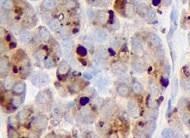Human Cadherin-6/KCAD Antibody Summary
Ser54-Ala615
Accession # P55285
Applications
Please Note: Optimal dilutions should be determined by each laboratory for each application. General Protocols are available in the Technical Information section on our website.
Scientific Data
 View Larger
View Larger
Cadherin‑6/KCAD in Human Liver Cancer Tissue. Cadherin‑6/KCAD was detected in immersion fixed paraffin-embedded sections of human liver cancer tissue using 8 µg/mL Mouse Anti-Human Cadherin‑6/KCAD Monoclonal Antibody (Catalog # MAB27151) overnight at 4 °C. Tissue was stained with the Anti-Mouse HRP-DAB Cell & Tissue Staining Kit (brown; Catalog # CTS002) and counterstained with hematoxylin (blue). View our protocol for Chromogenic IHC Staining of Paraffin-embedded Tissue Sections.
 View Larger
View Larger
Cadherin‑6/KCAD in Human Kidney Cancer Tissue. Cadherin-6/KCAD was detected in immersion fixed paraffin-embedded sections of human kidney cancer tissue using 25 µg/mL Mouse Anti-Human Cadherin-6/KCAD Monoclonal Antibody (Catalog # MAB27151) overnight at 4 °C. Tissue was stained with the Anti-Mouse HRP-DAB Cell & Tissue Staining Kit (brown; Catalog # CTS002) and counterstained with hematoxylin (blue). View our protocol for Chromogenic IHC Staining of Paraffin-embedded Tissue Sections.
Reconstitution Calculator
Preparation and Storage
- 12 months from date of receipt, -20 to -70 °C as supplied.
- 1 month, 2 to 8 °C under sterile conditions after reconstitution.
- 6 months, -20 to -70 °C under sterile conditions after reconstitution.
Background: Cadherin-6/KCAD
The cadherin superfamily is a large family of membrane-associated glycoproteins that engage in homotypic, calcium‑dependent, cell-to-cell adhesion events. The superfamily can be divided into at least four subfamilies based on the extracellular (EC) regions and cytoplasmic domains (1, 2). These include classical cadherins, desmosomal cadherins, protocadherins, and cadherin-like molecules that contain a variable number of EC and transmembrane (TM) domains (1). Cadherin‑6, also known as KCAD or K-cadherin, is a classical cadherin of 110‑120 kD that has at least one full length and two alternate splice forms ranging in size from 105‑120 kDa (3). Human Cadherin-6 is synthesized as a 790 amino acid (aa) type I transmembrane glycoprotein that contains a 18 aa signal peptide, a 35 aa prosequence, a 562 aa extracellular region, a 21 aa transmembrane segment, and a 154 aa cytoplasmic domain (4, 5). There are five EC cadherin domains that are approximately 110 aa in length. This pattern is consistent with classical cadherin family molecules that are modular in their extracellular region and mediate calcium‑dependent cell‑to‑cell adhesion through their Ca++-binding repeats (2). Due to the absence of a His-Ala-Val motif in its most N-terminal cadherin repeat, Cadherin-6 can be further classified as a type II classical cadherin (4). One Cadherin‑6 splice variant (termed 6/2) shows a 9 aa substitution for the 94 aa that span residues 283 to 376 of the full-length extracellular region (3). A second splice variant shows a 36 aa substitution for the C-terminal 163 aa of the transmembrane and cytoplasmic region (6). Human Cadherin‑6 shares 98% aa sequence identity with rat Cadherin‑6, plus 60% and 58% aa identity with human cadherin 8 and 11, respectively, within the extracellular regions. Cadherin-6 has high expression in kidney, brain, and cerebellum, and low expression in lung, pancreas, gastric mucosa, and cytotrophoblasts (4, 5, 7, 8, 9). Cadherin-6 is also found in renal, lung, and ovariancarcinoma (7, 10). As a classic cadherin, Cadherin-6 will form homodimers and promote intercellular adhesion with itself and possibly cadherin-9 and -14 (4, 11).
- Koch, A.W. et al. (2004) Cell. Mol. Life Sci. 61:1884.
- Angst, B.D. et al. (2001) J. Cell Sci. 114:629.
- Mbalaviele, G. et al. (1998) J. Cell Biol. 141:1467.
- Shimoyama, Y. et al. (2000) Biochem. J. 349:159.
- Shimoyama, Y. et al. (1995) Cancer Res. 55:2206.
- GenBank Accession # P55285.
- Xiang Y.Y. et al. (1994) Cancer Res. 54:3034.
- Marthiens V. et al. (2002) Mol. Cell Neurosci. 20:458.
- MacCalman C.D. et al. (1998) Am J Reprod. Immunol. 39:96.
- Sella, G.C. et al. (2001) Cancer Res. 61:6977.
- Shimoyama, Y. et al. (1999) J. Biol. Chem. 274:11987.
Product Datasheets
FAQs
No product specific FAQs exist for this product, however you may
View all Antibody FAQsReviews for Human Cadherin-6/KCAD Antibody
Average Rating: 5 (Based on 1 Review)
Have you used Human Cadherin-6/KCAD Antibody?
Submit a review and receive an Amazon gift card.
$25/€18/£15/$25CAN/¥75 Yuan/¥2500 Yen for a review with an image
$10/€7/£6/$10 CAD/¥70 Yuan/¥1110 Yen for a review without an image
Filter by:


